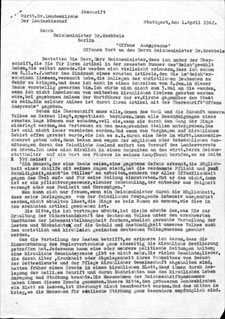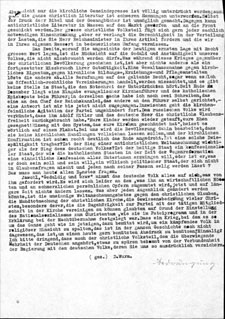Protest against Censorship
Wurm complained about the suppression of the Christian press in a first letter of November 10, 1941 to Reich Minister of Propaganda Joseph Goebbels. While anti-Christian publications were not experiencing any restrictions, Christian journalism was being curbed – supposedly due to the war – to a minimum (Schäfer, Fischer, Landesbischof, p. 273–275).
In a second letter of April 1, 1942, Wurm took up an editorial by Goebbels in the newspaper “Das Reich”. According to Wurm, the headline of “public talks” used there prompted a public statement since any glossing over of a serious situation could only do harm. Wurm insisted on an equitable distribution of the burden.
He again drew attention to the limits on paper consumption, which affected the church population one-sidedly, as well as to the coercive measures in the domain of schooling, upbringing and education, which heavily restricted the church’s work as well. In closing, Wurm asked that the Christian part of the population, i.e. the overwhelming majority of Germans, also be given a feeling of something of the government’s solidarity with the German people, which it so emphatically declared.
This intervention achieved particular significance since it was reprinted on December 17, 1942 in the Swedish newspaper “Trots Alls” and broadcast by Radio London; it was also published in German, Italian, French and English.
This prompted Hermann Muhs, state secretary in the Ministry of Church Affairs, to propose to Otto Thierack, Reich Minister of Justice since 1942, that charges be brought against Wurm. Martin Bormann’s reply to his question about the opportuneness of such a step to was negative. According to Bormann, the Führer did not wish any charges to be brought at the time for political reasons.
Source / title
- © Landeskirchliches Archiv Stuttgart, D1/106


